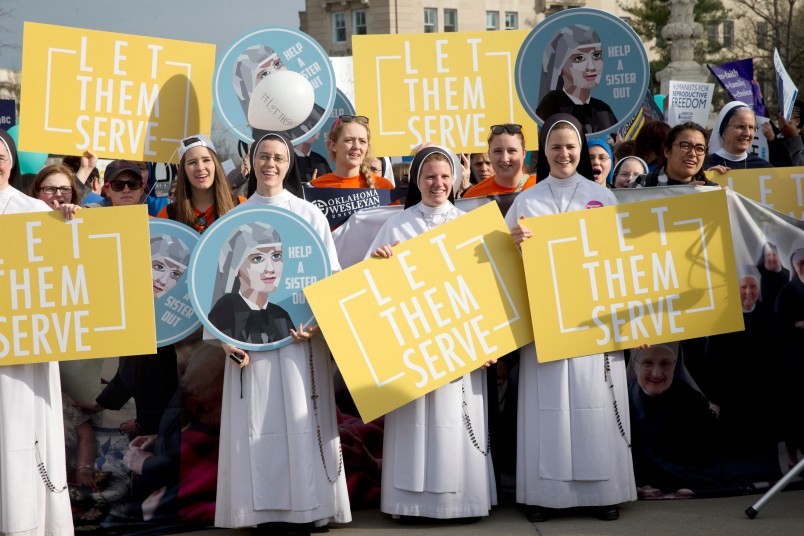In a surprise move Tuesday, the Supreme Court issued an order asking the challengers objecting to the accommodation for religious non-profits under Obamacare’s contraceptive mandate to brief the court on other alternatives to ensure that employees of religious nonprofits do receive contraceptive coverage.
The challengers in the case, Zubik v. Burwell, had objected to the accommodation because they said that even filling out the form opting out of the requirement was a burden on their faith, arguing it triggered the process for employees to receive contraceptive coverage from outside their plans.
At last week’s oral arguments, the court, and particularly the male justices in its conservative bloc, struggled when grappling with the question of how female employees of religious nonprofits would receive contraceptive coverage if the accommodation was not allowed to stand.
Now the court has requested the challengers provide briefs outlining other options. The briefs, due April 12, should address “whether and how contraceptive coverage may be obtained by petitioners’ employees through petitioners’ insurance companies, but in a way that does not require any involvement of petitioners beyond their own decision to provide health insurance without contraceptive coverage to their employees,” the court said.
The order offered one example alternative, in which the nonprofits would tell their insurance companies right off the bat that they did not wish to cover contraceptives. From there, it would be up to the insurance company to tell employees that cost-free contraceptive coverage would be provided to them outside of the employer plan.
“The parties may address other proposals along similar lines, avoiding repetition of discussion in prior briefing,” the order said, which suggests that the alternatives the challengers offered in their initial briefs, which mainly argued coverage could be provided directly by the government or through programs funded by the government, would not suffice.
Those defending Obamacare’s accommodation for the birth control requirement are allowed to respond in reply briefs due April 20.
The order also reflects the challenges the court faces with only eight members, after Justice Antonin Scalia’s death in February. At Zubik’s oral arguments, the justices appeared divided on ideological lines as to whether the accommodation should be allowed to stand. It’s likely that Scalia would have given conservatives the fifth vote they needed to strike it down.
However, a four-four tie decision produces no clear ruling on a case and offers no national precedent. It simply defers to the lower court’s decision (as was the scenario in the four-four decision the Supreme Court issued Tuesday on a major case concerning public unions.) In the Zubik case in particular, the consequences of a tie vote would have been especially complicated. The appeals court decisions involved in Zubik upheld the accommodation, but another appeals court in a similar case knocked it down.
Thus, a four-four decision could have possibly resulted in the employees receiving coverage in some states but not others, depending on the circuit court that covers them.
It appears, with Tuesday’s order, the court is searching for a compromise decision that would get at least five votes and avoid that scenario.
Read the full order below:







I trust there will be a brief submitted by noted birth control specialist Foster “Just hold an aspirin between your knees” Friess.
Did the female justices sit down the male justices and explain the facts of life about insurance coverage? I guess Kennedy really doesn’t want to make employers take the arduous task of filling out a paper stating that actually believe something, because what they really want is for contraceptive coverage to be removed from ALL insurance policies.
I’m guessing that’s exactly what happened. The Justices sit for an initial “conference” after the oral argument. Justice Sotomayor must have elaborated on the “falsehood” comment in oral argument and the others (4 conservatives) had a time to have their clerks confirm that they were suggesting an illegal alternative.
From personal experience, I know that method can be easily defeated . . .
This will be interesting! I was very surprised by the argument and Kennedy’s questions since he had seemed to indicated during Hobby Lobby he’d be fine with the current accomodation. (For the record, I still think he may be leaning towards upholding this or something similar but wants to look into this more). I think this is a good order because the petitioners now have to affirmatively come up with something reasonable they wouldn’t object to. If they go too far and suggest something that requires congress acting or requires two health plans it might tip Kennedy to finally agreeing that the accommodation is indeed the most narrow way. I’m perfectly fine with the example that the order suggested but I would assume they’ll complain that even mentioning their aversion to birth control in the plan up front is too much for them. Looking forward to reading these briefs.